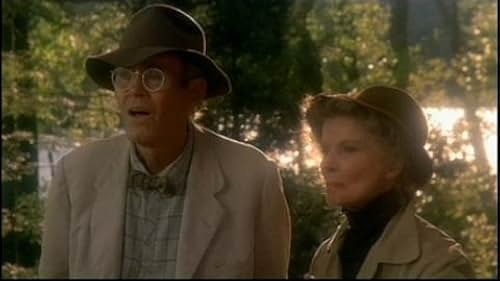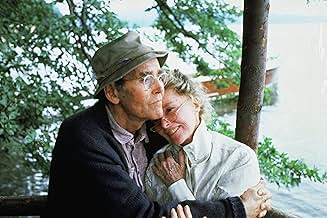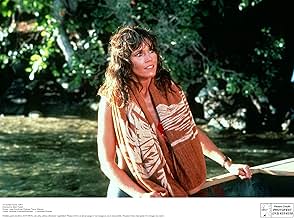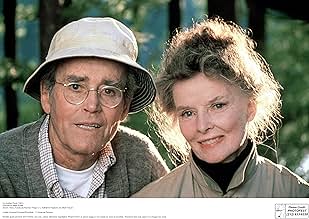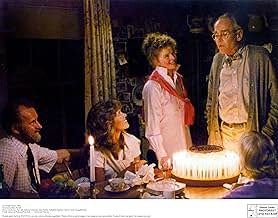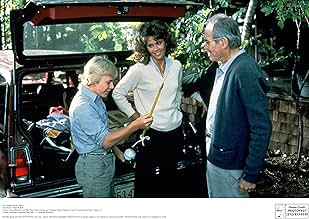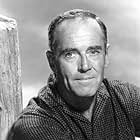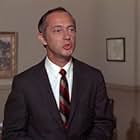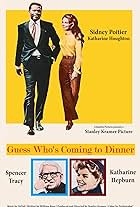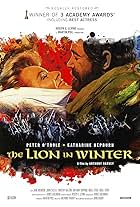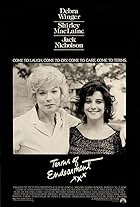Norman is a curmudgeon with an estranged relationship with his daughter Chelsea. At Golden Pond, he and his wife nevertheless agree to care for Billy, the son of Chelsea's new boyfriend, and... Read allNorman is a curmudgeon with an estranged relationship with his daughter Chelsea. At Golden Pond, he and his wife nevertheless agree to care for Billy, the son of Chelsea's new boyfriend, and a most unexpected relationship blooms.Norman is a curmudgeon with an estranged relationship with his daughter Chelsea. At Golden Pond, he and his wife nevertheless agree to care for Billy, the son of Chelsea's new boyfriend, and a most unexpected relationship blooms.
- Won 3 Oscars
- 14 wins & 24 nominations total
Storyline
Did you know
- TriviaThe brown Fedora worn by Henry Fonda belonged to Spencer Tracy and was given to Fonda by Katharine Hepburn on the first day on the set. Fonda, overwhelmed with the gesture, painted a still life watercolor of the three hats he wore in the film and gave the original to Hepburn as a gift. He had 200 lithographs made of the painting and sent one to every person who worked on the film. Each copy was numbered and personally signed by Fonda thanking each person by name. In her autobiography, Hepburn wrote that she gave the painting to screenwriter Ernest Thompson. After Fonda's death, she found the painting to be a sad reminder of him and Tracy.
- GoofsThe numbers of the pump show the cost of fuel to be 67.9 cents per gallon with a total cost of $19.00. The price of gasoline in 1981 was around $1.30 per gallon. However, old pumps were not capable of charging more than 99.9 cents per gallon, so they were set to half the price, and the total was then doubled. That is why the teenager asks for $38.00.
- Alternate versionsWhen premiered on TV, an extra credit dedicated to Henry Fonda was added to the final credits.
- ConnectionsEdited into Reflections on Golden Pond (2003)
- SoundtracksHappy Birthday to You
(uncredited)
Written by Mildred J. Hill & Patty S. Hill
[Sung by all for Norman's birthday]
Featured review
Mark Rydell's On Golden Pond was a surprise hit in 1981, finishing third in box office grosses after Rocky III and E.T. Such an occurrence was unheard of in Hollywood, considering the key players in the film, Henry Fonda and Katharine Hepburn, each had not had a hit film in almost twenty years and were both hardly spring chickens in the business. Both these veteran actors proved they could still make it in Hollywood among young starlets, and triumph. Still, when you see "On Golden Pond," you sense that their teaming together for the first time in their careers is purely a special occasion, an opportunity of a lifetime that few actors in their seventies receive. They in turn have left us with a wonderful showcase of movie talent, a film of warmth, good humor, and love.
It always amazes me when I read that Henry Fonda had only received two Oscar nominations during his career, one of which he earned for this film. Like his good friend Jimmy Stewart, Fonda was rarely a boisterous actor. He had a natural ease to his acting, a gift for making audiences believe that every word he uttered was truth. Now, in his final screen performance as Norman Thayer Jr., Fonda had to reach deep into his own personal experience and his advancing years to create a character who struggles with his own mortality. Norman is a grouchy curmudgeon who has memory lapses and heart palpitations. He has a loving and cheerful wife, Ethel (Hepburn), but a difficult relationship with his only daughter, Chelsea (Jane Fonda). He and Ethel journey back to their cottage on the lake for what may be their last summer. Immediately, Norman comes face to face with his old age and his inability to remember what should be familiar sights. I especially like the scene where he gets lost in the woods looking for strawberries and scares himself when he is unable to find his way back. Ethel has such faith in him, sure he will "get back on that horse" and be as valiant as he once was. What more could you want from a wife?
Chelsea arrives after many years away from her parents, bringing with her a new boyfriend (Dabney Coleman) and his son, Billy (Doug McKeon). You can sense the tension between Chelsea and Norman the minute she walks in the door. This reunion is fascinating not only because we can never tell where the difficulty lies in their relationship, but also the fact that these problems also exist on and off the screen. The father-daughter relationship between Henry and Jane was also very turbulent ever since Jane began her protests in Vietnam, much to the chagrin of her father. This collaboration of the two was meant to mend fences between them. Not often do the personal lives of actors collide so eloquently in Hollywood, but here it seems just about right.
The sequence where Norman and Bill (Coleman) attempt to build a conversation is originally conceived and acted so naturally. He carefully asks Norman if it would be alright if Chelsea and he sleep together in the same room at the cottage. Of course, Norman makes this confrontation as difficult as possible, making Bill nervous and jerking him around. Ironically, Bill comes back at him, not allowing Norman to use him in petty mindgames and hoping they would become friends, which is obviously "not an easy task." This is an unsettling turn for Norman and the audience, but it is necessary for the story to progress and for Norman to respond accordingly to the other characters in the story.
Ethel and Norman volunteer to let Billy stay with them for the summer while Chelsea and Bill head off to Europe. Billy is not pleased with the arrangement at the outset, but gradually bonds with Norman through learning to fish on the pond. While Billy is not necessarily an original character, it is fascinating to see him try to understand Norman, and in turn how Norman learns to associate with the son he never had. It is a learning experience for both of them, even though they are many generations apart.
Many reviewers have remarked that ON GOLDEN POND uses a conventional story and revives it with great performances from the cast. It is interesting to note that the screenwriter, Ernest Thompson, altered his own play in order to escape a bit of the conventionality that the film medium required. The framework may seem as original as an old shoe, but the added touches in the script and its delivery give this film a certain magic that only classical Hollywood films possessed. Fonda has a great way to end a career with this role, placing himself completely within Norman's world and searching within and through the role for his own solutions to life's problems. His Oscar was given to him for more reasons than mere charity. Hepburn is delightful as Ethel, working so well with Fonda that it does not seem as if they are acting. For a couple of old Hollywood actors who never even met before this, they each prove they are true masters of their craft. Jane Fonda takes a supporting role this time, incorporating some of the same motives as her father into her part, and as a result delivers a special performance. Mark Rydell is one of those directors that often gets left off the list of the all-time greats, but proves once again here he is a masterful storyteller. In this project, he allows both the visual elements of the pond and his actors to make magic, a truly memorable combination.
On Golden Pond is not an epic, but what it accomplishes runs close to epic proportions. It is very rare that a stageplay converts so well to the screen like this one. On Golden Pond is vibrant, emotional, and so heartfelt, it is impossible not to like, unless you are a curmudgeon like Norman Thayer. It is also unique that great actors such as these will agree to try again for Hollywood glory so late in their careers. It is up to us viewers to experience this wonder before the chance is lost and these thespians finally close up the cottage and head off to their retirement.
It always amazes me when I read that Henry Fonda had only received two Oscar nominations during his career, one of which he earned for this film. Like his good friend Jimmy Stewart, Fonda was rarely a boisterous actor. He had a natural ease to his acting, a gift for making audiences believe that every word he uttered was truth. Now, in his final screen performance as Norman Thayer Jr., Fonda had to reach deep into his own personal experience and his advancing years to create a character who struggles with his own mortality. Norman is a grouchy curmudgeon who has memory lapses and heart palpitations. He has a loving and cheerful wife, Ethel (Hepburn), but a difficult relationship with his only daughter, Chelsea (Jane Fonda). He and Ethel journey back to their cottage on the lake for what may be their last summer. Immediately, Norman comes face to face with his old age and his inability to remember what should be familiar sights. I especially like the scene where he gets lost in the woods looking for strawberries and scares himself when he is unable to find his way back. Ethel has such faith in him, sure he will "get back on that horse" and be as valiant as he once was. What more could you want from a wife?
Chelsea arrives after many years away from her parents, bringing with her a new boyfriend (Dabney Coleman) and his son, Billy (Doug McKeon). You can sense the tension between Chelsea and Norman the minute she walks in the door. This reunion is fascinating not only because we can never tell where the difficulty lies in their relationship, but also the fact that these problems also exist on and off the screen. The father-daughter relationship between Henry and Jane was also very turbulent ever since Jane began her protests in Vietnam, much to the chagrin of her father. This collaboration of the two was meant to mend fences between them. Not often do the personal lives of actors collide so eloquently in Hollywood, but here it seems just about right.
The sequence where Norman and Bill (Coleman) attempt to build a conversation is originally conceived and acted so naturally. He carefully asks Norman if it would be alright if Chelsea and he sleep together in the same room at the cottage. Of course, Norman makes this confrontation as difficult as possible, making Bill nervous and jerking him around. Ironically, Bill comes back at him, not allowing Norman to use him in petty mindgames and hoping they would become friends, which is obviously "not an easy task." This is an unsettling turn for Norman and the audience, but it is necessary for the story to progress and for Norman to respond accordingly to the other characters in the story.
Ethel and Norman volunteer to let Billy stay with them for the summer while Chelsea and Bill head off to Europe. Billy is not pleased with the arrangement at the outset, but gradually bonds with Norman through learning to fish on the pond. While Billy is not necessarily an original character, it is fascinating to see him try to understand Norman, and in turn how Norman learns to associate with the son he never had. It is a learning experience for both of them, even though they are many generations apart.
Many reviewers have remarked that ON GOLDEN POND uses a conventional story and revives it with great performances from the cast. It is interesting to note that the screenwriter, Ernest Thompson, altered his own play in order to escape a bit of the conventionality that the film medium required. The framework may seem as original as an old shoe, but the added touches in the script and its delivery give this film a certain magic that only classical Hollywood films possessed. Fonda has a great way to end a career with this role, placing himself completely within Norman's world and searching within and through the role for his own solutions to life's problems. His Oscar was given to him for more reasons than mere charity. Hepburn is delightful as Ethel, working so well with Fonda that it does not seem as if they are acting. For a couple of old Hollywood actors who never even met before this, they each prove they are true masters of their craft. Jane Fonda takes a supporting role this time, incorporating some of the same motives as her father into her part, and as a result delivers a special performance. Mark Rydell is one of those directors that often gets left off the list of the all-time greats, but proves once again here he is a masterful storyteller. In this project, he allows both the visual elements of the pond and his actors to make magic, a truly memorable combination.
On Golden Pond is not an epic, but what it accomplishes runs close to epic proportions. It is very rare that a stageplay converts so well to the screen like this one. On Golden Pond is vibrant, emotional, and so heartfelt, it is impossible not to like, unless you are a curmudgeon like Norman Thayer. It is also unique that great actors such as these will agree to try again for Hollywood glory so late in their careers. It is up to us viewers to experience this wonder before the chance is lost and these thespians finally close up the cottage and head off to their retirement.
- How long is On Golden Pond?Powered by Alexa
Details
Box office
- Budget
- $7,500,000 (estimated)
- Gross US & Canada
- $119,285,432
- Opening weekend US & Canada
- $89,213
- Dec 6, 1981
- Gross worldwide
- $119,285,810
Contribute to this page
Suggest an edit or add missing content


